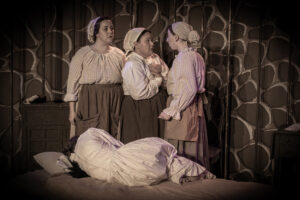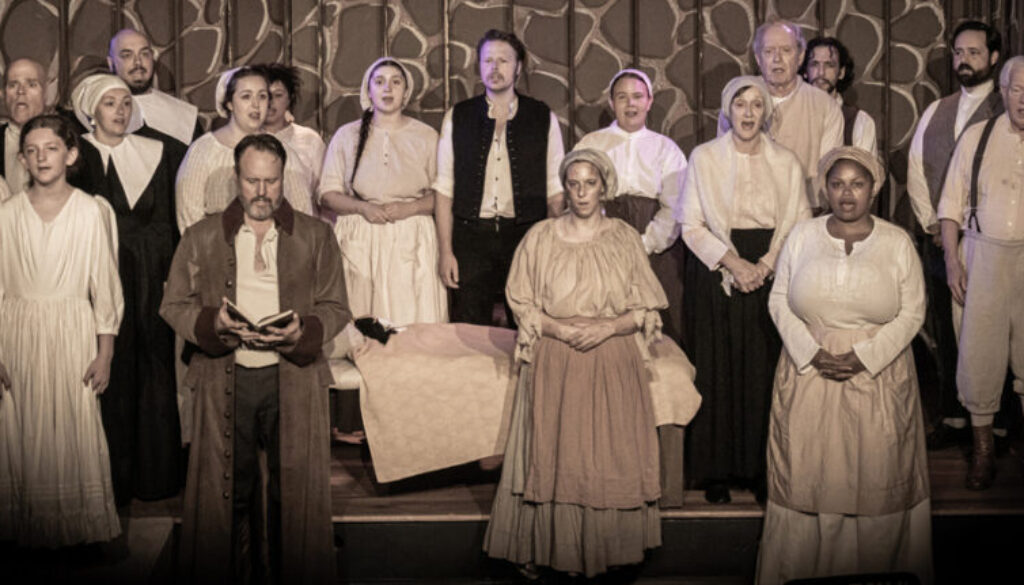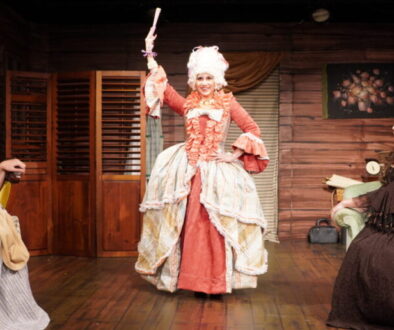By ALAN SMASON, WYES-TV Theatre Critic (“Steppin’ Out“)
When Arthur Miller debuted The Crucible in 1953, the nation was emerging from the dark and sinister times of accusations and recriminations known as McCarthyism. The historical drama based on the Salem Witch Trials, but also fictionalized, was intended to bring comparisons from the past to the modern era.

Given the political landscape of today with American society on edge about xenophobia and a great many other perceived ills or highly divisive issues, it is probably an opportune time to bring back The Crucible as a way of linking the hysterical to the historical.
Fat Squirrel Productions’ founder and artistic director Andrea Watson apparently thought so. The Crucible has been in the popular canon for some seven decades, but it has not been produced as much as other plays from the same era by other playwrights. That’s probably because the language is somewhat archaic, it requires a huge cast (20 players in this production) and it demands exceptional actors to delve deeply into the motivations of the characters.
Serving as the director of this production, Watson opted to find a possible medical explanation for the afflicted girls represented in the work who were accused of being enchanted by witches. The medical condition is called Conversion Disorder and it is marked by tremors, fainting, catatonia, hallucinations, tics and rapid temperature changes.
The director poses the question in the program: “What if the girls aren’t lying?”

As she explains, “In this production we explore the possiblity that they are truly experiencing what they say they are, and what they are describing is a shared psychological phenomenon brought on by the stress and trauma of being a young woman in a Puritanical patriarchy.”
Of course, it was the unsettling behavior of the girls that set off the bizarre series of trials in colonial Massachusetts which led to the string of accusations and eventual executions of 20 people – mostly women– in 1692.
The colony’s authorities attributed the girls’ unexplainable behavior to spells being cast on them by practitioners of sorcery. The young women made outlandish claims regarding members of the colony who were later arrested, put on trial and executed.
Watson makes sure that the girls distended fingers and limbs, facial tics and tremors are at the forefront of their performances in keeping with her theme of Conversion Disorder. As colony and court officials question the girls’ motivations, their mannerisms ramp up appreciably, giving greater credence to their afflictions and to their being beset by witchcraft.

In the midst of this witch hunt stands Elizabeth and John Proctor, a young couple swept up in the maelstrom of accusations by the girls. Jonathan Mares plays John Proctor with conviction and an intensity that fills the stage. He brings charges against Abigail Williams (Emory Farber), the girls’ leader, a servant girl who had been discharged from his household due to an ill-advised affair with him. His attempt to free his wife and others from persecution and prosecution proves to be his demise.
As Elizabeth Proctor, Anja Avsharian also delivers a remarkable performance full of stoicism and bravery as a woman who will not give in to the pressures of “confessing” her sins or calling out others as a means of avoiding the gallows. Her emotionally charged, gut-wrenching scenes opposite Mares as her husband are more understated than his, but are no less effective.
As the chief prosecutor Deputy Governor Danforth, Clint Johnson is chilling and perfectly executed. If Miller could have invented a literary character of the past to mirror the horrific actions of Senator Joseph McCarthy (and others) in his day, Danforth would be that character. Like McCarthy, who accused everyone who did not cooperate with his investigation as being a communist, Danforth asserts that everyone who is opposing him must be part of a coven or are being influenced by a coven. Johnson, who has largely been missing from the stage is a superior actor and his interaction with the other actors on stage is palpable.

John Jabaley plays the Rev. Samuel Parris, as an overprotective father of one of the girls, Betty, who wishes to enhance his standing in the community as the town’s preacher. At first, he is an opportunist, but eventually, as the trials are instituted and the lists of the accused grow ever longer, even the deputy governor sees through his intentions and recognizes the snivelling sychophant for what he is, putting him in his place at play’s end.
Veteran actors James Wright and Mary Pauley are also wonderfully cast in supporting roles. They portray two of the accused –Rebecca and Francis Nurse – a married couple swept up in the terror of the time. Also of note is Benjamin Clement in the role of Sheriff John Willard, who is somewhat sympathetic to the plight of the Proctors and others he is charged with arresting.
In today’s era of “fake news,” disinformation and misinformation, The Crucible stands as a reminder of how well-intentioned segments of society can go completely awry and attempt to find solace in punishing those with whom they disagree politically.
Watson noted that she did not have to change a single word in Miller’s text in order to make a statement that was pertinent for today’s fractious political climate. Indeed, the work of these dedicated actors resonate with the political and social upheaval endured on a national and regional basis.
Costumes were coordinated by Enjoli Gilbert with Lighting by Stephen Turber. Stephanie Garrison served as the dramaturg.
The Crucible continues its run at Big Couch, 1045 Desire St. in New Orleans through August 14. Tickets are available here.





